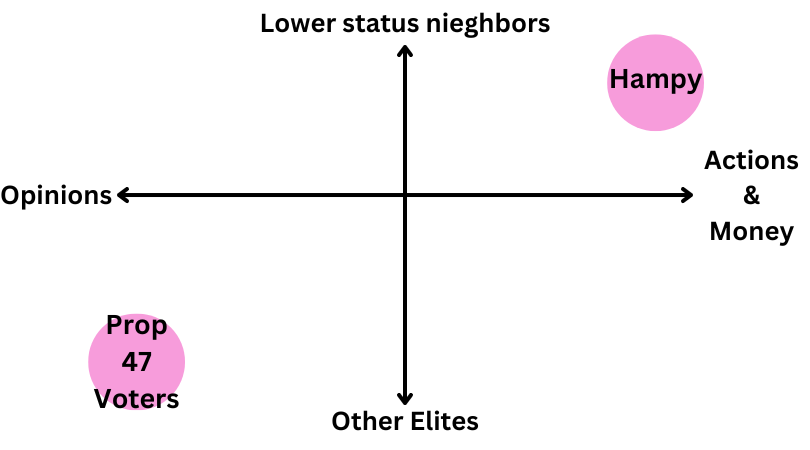What's the Harm in Harm Reduction
How we may be killing addicts with kindness.
Violent crime, homelessness, and drug deaths have surged in California in recent years. And Micheal Shellenberger blames himself.
Source: https://substack.com/home/post/p-142244242?source=queue
Well, more accurately, he blames himself and millions of other voters who voted for Prop 47. The proposition “reduced the penalties for hard drug possession and shoplifting.” The results of this permissive governmental parenting have been a disaster.
As just one example, Shellenberger reports deaths from drug overdose in San Francisco—which at one time mirrored the national average—have now risen to more than double the national average. And keep in mind, the national average is a tragedy.
What would make otherwise intelligent individuals vote for Prop 47?
Haven’t California voters heard of enabling? Would they run their workplaces without standards, metrics, and performance reviews? Would California voters stand idly by as children gobble up non-organic, cage-raised cheese puffs loaded with transfats and fructose syrup?
Of course not. They’d put their collective feet down about these things.
A possible explanation from an unlikely source
Perhaps the best explanation of California’s collective lunacy, is that they were undone by their own luxury beliefs.
The term “luxury beliefs”—coined by Rob Henderson—refers to beliefs that elites use to set themselves apart from the masses.
Henderson is an author and psychologist who was born to a drug-addicted single mom. He grew up in the foster care system and was adopted by a working-class family that eventually disintegrated through divorce. He was a teenage delinquent. Yet Henderson graduated from Yale and obtained an advanced degree from Cambridge. His new memoir is out and it details his incredible journey from Child Protective Services to Yale and Cambridge. If your reading list is full, his interview with economist Glenn Loury is a fantastic introduction to his life and his theory of luxury beliefs.
Henderson came up with the term “luxury beliefs” to explain why his Yale and Cambridge friends had such unusual ideas—ideas that seemed strange and unworkable to his childhood friends and those he knew in the military.
What are luxury beliefs?
To understand luxury beliefs, you first must understand luxury. The wealthy and powerful have always had ways to display their status. In some cultures, wealthy chiefs would burn a pile of possessions. This practice may have meant something specific in the context of their society. But, it also effectively transmitted the message: “I got so much stuff, I can waste it.” The possession burning was a large-scale version of lighting a cigar with a $100 bill.
In modern society, the way to transmit your status has often been through purchasing expensive items that are out of reach of the common man. But, modern elites have run into a problem.
Expensive watches, electronics, and fashion items are not as far out of reach for the average American as they once were. And nowadays the rich consider it somewhat vulgar to announce their superiority with luxury goods. Conspicuous consumption makes you look like you contribute to global warming or economic disparities. You know. . . the kind of person Greta Thunberg shouts at.
So what’s a discerning noble person to do? Signaling your status is still important—But how can one convey one’s status without status symbols?
Henderson says the best way to show the world you have impeccable education and breeding is to let your “luxury beliefs” do the talking for you.
Luxury beliefs are beliefs that show the world how open-minded, compassionate, and progressive you are.
Henderson cites a number of these luxury beliefs
Defunding the police. When a wealthy person calls for defunding the police, they look virtuous and socially conscious. And since their neighborhoods are generally safe, why not?
Decrying white privilege. When wealthy whites self-flagellate about their privilege, it’s the ultimate humble brag. You appear self-critical and modest, but you’re actually increasing your status in the eyes of others.
Saying, “sex work is work.” Everyone knows that exchanging sex for money is categorically different than waitressing or selling life insurance. But, like the villagers in the story of “The Emporer’s New Clothes,” elites don’t want to call BS on this idea for fear they will appear foolish or bigoted to their friends who claim they can see how Only Fans and prostitution are perfectly fine ways for women to earn extra cash. Luise Perry does an excellent takedown of this luxury belief if you are interested.
Being dismissive of marriage. Henderson tells the story of an elite female friend who railed against marriage for being an outdated institution. He thought her statements were odd—especially because this friend was born into an intact family and planned to replicate this pattern in her own life. So why all the “down with marriage” talk? Because it was uncouth to tell others how to live their lives. And sneering at marriage showed the world she wasn’t some petty suburbanite.
Another example of a new and trendy luxury belief is “cultural appropriation”. In the video below a young man wears a “Mexican Costume” for Halloween and solicits reactions from college students and working-class Mexicans. Predictably, the college students find his outfit offensive, and the working-class Mexicans don’t.
(Not so) incidentally, I showed this video to my Mexico-born wife and asked her what she thought of the man’s costume. She struggled to grasp why the college students were upset. She has purchased ponchos and guayaberas for me because they are handmade and she likes how they look.
And it’s not just clothes—it’s true of music, too. She really liked this video of two guys in The Netherlands playing Mexican music in honor of Flaco Jimenez’s birthday. Apparently, my wife isn’t sophisticated enough to be offended by these accordion-playing racists.
I’m not out to hurt your feelings
I realize many of the ideas that Henderson classifies as “Luxury Beliefs” might be considered sacred cows to some of my readers. You may be— or love— a person who cares deeply about one or more Luxury beliefs. But regardless of your political leanings, I hope Henderson’s basic point isn’t controversial: Our beliefs often distinguish us along class lines. And espousing Luxury Beliefs sets a person apart from the meat-and-potatoes MAGA voter.
Elite and educated individuals in California voted for Prop 47 because it signaled to the world that they were not standard-issue commoners. They could rise above the ordinary person’s antiquated belief in limits and public safety. They were special— and because they were special—they espoused a set of beliefs that were more nuanced and compassionate than the beliefs held by Fox viewers.
Who does it hurt?
One of the key features of a luxury belief is that it confers status on the individual— while simultaneously exacting a cost on the lower classes. I think this describes Prop 47 perfectly. Voting for the proposition allowed the elite to feel good about themselves— but the proposition has resulted in the deaths of thousands of addicts. And it has caused increases in crime victimization for those who can’t buy their way into a safe section of town.
Prop 47 was the equivalent of burning a pile of possessions. It sent the message that you were so secure in your elite status that you could play games with the fabric of a community while continuing to eat locally sourced, non-GMO avocado toast.
Bring back the Aristocracy
All this talk of luxury beliefs is making me nostalgic for something very regressive and unsophisticated. If I share my thoughts, I will certainly be called out for paternalism, chauvinism, and worse. But . . .
What if the elite recaptured the idea of nobless oblige? There was a time when those with wealth and power felt obligated to protect the less fortunate through policies that held society together, not ones that would tear it apart. This article by the Imaginative Conservative describes an English aristocrat, named Hampy, who lived out the Biblical verse: “To whom much is given, much will be required.” As a wealthy and educated individual, he used his position to reinforce pro-social norms and institutions in his community. The author says this about Hampy and his ilk:
These aristocrats not only provided the employment [for the village], they funded the local old folks home, ran the village school, nurtured the social life of the village, motivated the charitable works of the church and made sure no one was excluded. As they lived together they not only lived out the principle of solidarity, but also the principle of subsidiarity—the idea that problems should be solved and initiatives taken at the lowest, most local level possible.
The big difference between Hampy and the average voter for Prop 47 is that Hampy generously shared his wealth and friendship with his lower-status neighbors. The Prop 47 voter, on the other hand, showed off their luxury beliefs to their peers. One way to show how Hampy and the average Prop 47 voter differ from one another is to use a dual-axis chart. On one axis, is a continuum from “opinions” to “actions and money. Prop 47 voters merely expressed a popular opinion through their vote. Hampy and other aristocrats did things. They took action to improve the lives of others and used their own money to help.
The other axis is a continuum from “other elites” to “Lower status neighbors”. By voting for Prop 47, the modern voter is playing to an audience of other elites. They are showing off their compassion. Hampy and the aristocrats chose actions that put them in contact with lower-status neighbors.
Knowing how important Christianity has been in English society in the past, I have to believe Hampy’s motivation came not from his desire to appear righteous in the eyes of his fellow elites, but from his desire to please God. He wasn’t ultimately concerned with status on earth, but in treasure in the coming age.
17 Command those who are rich in this present world not to be arrogant nor to put their hope in wealth, which is so uncertain, but to put their hope in God, who richly provides us with everything for our enjoyment. 18 Command them to do good, to be rich in good deeds, and to be generous and willing to share. 19 In this way they will lay up treasure for themselves as a firm foundation for the coming age, so that they may take hold of the life that is truly life.
[1 Timothy 6:17-19]








This is brilliant.